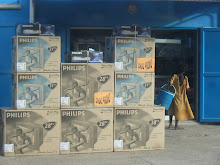Thursday, February 01, 2007
my digs in Kaolack
I spent five days in Kaolack working at an NGO (non-governmental organization). Kaolack is a small dirty city Southeast of Dakar. It was incredibly hot and infested with tons mosquitoes (that is saying a lot for Senegal). In Kaolack I lived in a house with 30 or more people. We had running water only at certain times and the rest of the times we used water from a well on the compound. The well water was actually warmers than the running water so it was a treat for me. Some of the people who lived in the house were from nearby villages who came to Kaolack for their education. Other people who lived in the house were bakers who made thick country bread in a wood-burning stove. The actual members of the family were only about seven of the inhabitants. In addition, there were many women there who helped with the cooking and cleaning but who were clearly not maids, bakers, or students. I never figured out what they did and why they lived in the house. One of the mystery women taught me how to make fataayas, which are pockets of dough filled with tuna and spiced onions. Before learning how to make them I was convinced the filling was gross mystery meat. It was nice to know that I was wrong. In any case, I had the pleasure of sharing a bed with the woman I worked with at the NGO. Occasionally I would wake up to find that one of the toddlers in the house had nestled between us sleeping peacefully and deeply. I soon found out that my room also doubled as an armoire for about ten of the houses’ inhabitants. During all hours of the day and night people would enter and take what they needed out of the enormous armoire and leave. Some of the women would undress or get dressed in the room. I, on several occasions, walked in on half naked women getting their toiletries and bathrobe for the shower. I, as the resident awkward American, averted my eyes and grabbed what I needed and left. At night I frequently awoke to people shuffling in and out. To me this constant movement of people in what I considered to be my bedroom was incredibly mind-blowing for two reasons. One, in my house in Dakar my room is my own. I lock it when I leave and people only enter if invited. I leave my door open when I am present in the room but close it if I leave it. Two, as an American I have a very particular sense of space. I need a lot of it. Whether it manifests while talking to people, driving, or a physical space to go call my own. Americans tend to use their rooms as havens for places to go to be alone, to think, to escape, to pout, to read, etc. In Senegal this is not the case. People are more community based. Old men are the only ones given the freedom to retreat to their room whenever they like. Others stay in the living room or courtyard as a large group talking and eating. Senegalese tend to share the belongings freely and generously; therefore, my preoccupation with the security of my belongings was not far off except that this family understood that toubabs do not share like Senegalese share. My things were untouched and stayed near where the extra television and DVD player was stored. Regarding bedrooms, it is common for parents with a kid or two to share a room or several siblings to share a bed. Rooms are hangout spots for younger people but the door must be kept open. Most of the time they use their rooms as a place to listen to music and make tea. Kaolack was without a doubt a true cultural experience. I am thankful that I had it.
Subscribe to:
Post Comments (Atom)

No comments:
Post a Comment